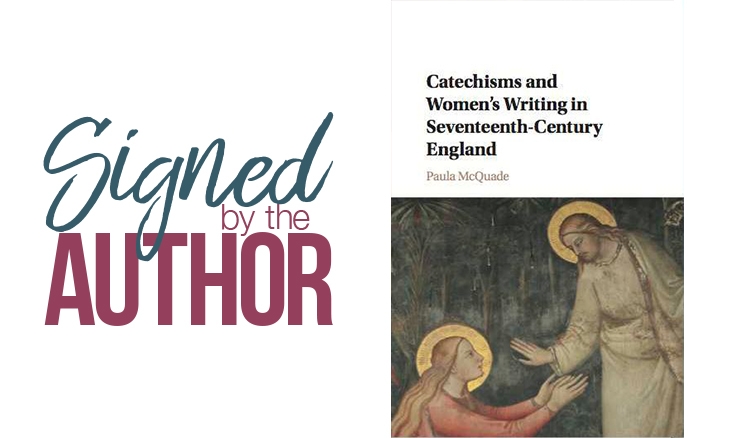 (DePaul University/Jeff Carrion)
(DePaul University/Jeff Carrion)
By: Paula McQuade, Department of English
"Catechisms and Women's Writing" examines original works composed by women - both in manuscript and print - and the construction of these materials from other sources. By studying female catechists, the book shows how early modern women used the power and authority granted to them as mothers to teach religious doctrine, to demonstrate their linguistic skills, to engage sympathetically with Catholic devotionals texts and to comment on matters of contemporary religious and political import.
What's the most surprising thing you learned while writing this book?.jpg) (Image courtesy of Cambridge University Press)
(Image courtesy of Cambridge University Press)
How smart these women were. Really, truly, smart. They haven't fared well historically when compared to male authors of the period, like Shakespeare, because they have been judged by contemporary taste which values more literary forms like plays and poetry. The book argues that to appreciate their intelligence, we have to expand our understanding of writing to include other genres, including prayers, catechisms, and devotional treatises. But when we do so, we can appreciate how smart and innovative and resourceful these women were. Smart, ambitious, and creative, they wrote catechisms to educate their children, defend their family's reputation, affirm women's ability to teach the good news of Christianity and intervene in contemporary political debates.
Who inspired you to write this book?
My grandmother. She was a first generation immigrant from Poland who had to drop out of school in the 4th grade to work at a hotel to help feed her family, but she was a devout Catholic and a voracious reader. When I would visit her, her house would be full of religious books by well-regarded Catholic authors - Aquinas, Augustine, Dante. I developed the central thesis of my book - that domestic catechesis helped 17th century women develop as readers and writers because of her example. She was 'living proof' of the positive impact home religious education could have upon women's literacy.
About the author:
Paula McQuade, an associate professor of English at DePaul, received her Ph.D. from the University of Chicago in 1998. The recipient of a 1996 Charlotte Newcombe Fellowship, McQuade is the author of multiple articles on early modern women and gender. Her article on the female catechist Dorothy Burch was selected as the best article published in 2010 by the Society for the Study of Early Modern Women Writers. She is also the recipient of an Excellence in Teaching Award from DePaul University.
Publisher, publication date:
Cambridge University Press, July 2017
Signed by the Author allows DePaul faculty and staff to introduce their recently published or upcoming book or chapter to the university community. To submit your book or chapter for consideration, contact Newsline.